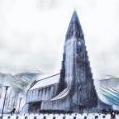Leaderboard
Popular Content
Showing content with the highest reputation on 01/14/2023 in all areas
-
Jesus, that's a lot of music! (like my pun? lol) I'm not sure how to begin, so I'll just ramble for a bit. This will probably come across a little random, but hopefully you find some value in my thoughts. So I listened to the whole thing, first of all. I really wanted to get your overall impression rather than dissecting this one movement at a time. I'm honestly glad I did it that way, because your piece is very programmatic which you stated. You constantly bring back themes or perhaps leitmotifs, which I thought was very fitting for the content. After hearing it in its entirety, your piece fell victim to something I predicted when first hearing it. There's lots of sadness and despair to the theme, and even though there can be some moments of joy and redemption, I felt like it would be very hard to capture the mood for an hour of interesting music. Overall, it's a very constant grave/lento tempo throughout, and it was hard to keep interested at times. One thing you could maybe do to enhance the general shape of the music is to have a lot more sections of faster tempos, or maybe more sections with lots of movement in the textures. I know you give us moments of that (mvt. 2 cellos and violas, mvt. 3, but still a walking pace, mvt. 7 with the builds), but I don't think it was enough for an hour long piece. Even if the program element might not literally call for that, I think the music needs it. You probably already know this, but the textures are very lacking. There are lots of tutti and block chords. I strongly encourage you when you begin orchestrating to constantly think of the overall texture. Really think about the instrument groups, the amount of color at your disposal, solo and duet passages, etc. I purposely don't want to give any thoughts on how I would orchestrate any of it, I think that would take away from the fun you'll have when doing so. Just be creative with it is all I mean. Even the several spots where you repeat a theme, really think about the different ways to execute that. The registers were very consistently on the low end of things as well. Vary that up too! You can still paint the picture of a solemn atmosphere by really exploring the instrument ranges as well. I know this version isn't your final vision of the piece, but many of the bass parts could have been given to another cello part instead. Also the 2nd viola going to the violin. Yes you were going for that darker color, but, and especially with the bass, it really sounds muddy with the split parts. You may not like this, but a suggestion I have for you is to nix the idea of the full orchestra and make this for string quartet or another chamber ensemble. For one, it would be much easier to finish a work you have written over the last several years, and you could really learn a ton by giving yourself the restriction in instrumentation to fully utilize the strings. There's a lot of articulations and technique for strings that you didn't use, and maybe it could be a cool opportunity to explore that. There's bowing, pizzicato, glissando, harmonics, and a gazillion other ways to give color for the strings that would be fun to try out. HOWEVER...I know you're very passionate about the material, and this piece is probably very close to your heart, so I'm not saying don't orchestrate it. If that's your goal, that by all means go for it. I'd love to hear this orchestrated. I just would hate for you to spend so much time on a piece without venturing on to new music. You seem to really love orchestral music, so yeah man, do it if it's a major goal for you 🙂 Now, with all that said, I'd like to share some things I really liked about this. My favorite part is the theme at the end of mvt. 2 and brought back in mvt. 7. I love those chords, the harmony is very moving and speaks to my soul. Also, in mvt. 4, around 2:20 and done again later is a really cool section, I just wish it was longer! Mvt. 5 was very cool, I loved the slow chords with the solo bass. Awesome sound, just make sure to add little bits of color, or texture, or movement over the chords, because after a while it tends to get stale. But the idea is very cool, reminds me of something Shostakovich would do. Mvt. 6 had some cool chromatic lines, I really liked that. Again though, think of ways to vary up either the color or the groupings as it wears on me after a while. While I'm thinking of the timpani, also I'd think about what other percussive devices you could use in this. Just remember it's 2023, I'd take full advantage of exploring all of the different options you have in percussion as you go about orchestrating. So in general, congratulations on creating such a behemoth work. I myself have never written anything that long, so kudos to you for being able to see this one through the end. Hopefully I didn't come off as too critical. Yes I feel like this needs a bit of work, especially in your pacing and textures, but I feel like you got the hard part out of the way. You already know all of your themes and harmonies, now you really get to have a lot of fun bringing this more to life by being creative in your orchestration. I'm very curious how this will turn out, definitely let me know once you're completely done if I happen to miss it. Thanks again for sharing!2 points
-
Favourites in that they fire me up one way or another! The tempestuous and threatening - and the jubilant. Shostakovitch's 10th Symphony Scherzo - not alone with this one. https://www.youtube.com/watch?v=bCypb--lv1M The jubilant - the Allegro Molto Vivace from Tchaikovsky's Symphony 6. https://www.youtube.com/watch?v=RicAP5l_qr0 (A redering by Boult - far from the most lively. Look up Karajan's) Play both LOUD.2 points
-
Piano Sonata no.1 in A major Pastoral First Movement 13-01-2023.pdf This is the scored version of the first movement of my Piano Sonata no.1 in A major, Pastoral (2015). It's called pastoral since I subconsciously use the theme from Beethoven Symphony no.6 in the same name. It's more influenced by Beethoven's op.101 though. This movement and the whole sonata is basically a practice on using one single motive throughout the piece. In this movement sonata form is used. The prime motive is used as the first subject and the inverted form is used as the second subject. Hope you enjoy! I personally don't value this piece highly though. I plan to record the 2nd movement as well, but the 3rd and 4th movements I am in doubt of their quality, so I probably won't record them. P.S. Please find the youtube video, mp3 and pdf file! This recording is recently recorded and the score is polished a little bit. Henry P.P.S. The second movement of the work is posted on YC with the link below:1 point
-
1 point
-
This was the first large work I wrote and does not reflect my current abilities. I started writing it in September 2019 and finished in January 2021. I'm posting it here because I'd like to make a revised and fully orchestrated version in the future and need some feedback for that. The piece is programmatic with 7 movements, an introduction, and a finale. I will share the intended the program in case there are better ways of depicting them. The introduction serves no programmatic purpose, but does introduce the most important motif, the four descending notes. The first movement is the Prophesy of Simeon and for its structure I state material and then stick that into a slower section in an attempt to imitate questions and wise answers. After the final answer is a musical "pierce" since Simeon says that Mary's heart will be pierced by a sword of sorrow. The movement closes sadly, foreshadowing the fifth movement. The second movement is the Flight into Egypt. In the story, an angel warns Joseph of King Herod's intent to kill Jesus, so they flee through the harsh desert to Egypt. The music reflects that with a slow beginning and then an agitated theme in a mode. Then, for when they arrive and live peacefully in Egypt, there is a calm hymn-like theme. A fugue transitions to repeat the angel section from the beginning, as an Angel tells them they are to return since Herod is dead. The agitated desert theme resumes and when they make it back, a very important theme plays, closing the second movement. The third movement is the Loss of the Child Jesus in the Temple. The movement begins calmly with the theme that ended the previous movement, as in the program, Mary and Joseph are walking home without the knowledge of Jesus being left behind. The structure of the rest of the movement is a series of 3 marches for the 3 days they spent look for Jesus. The movement closes with the hymn-like theme. The fourth movement is Mary's Meeting Jesus on the Via Dolorosa. This is the movement I dislike the most. The idea was for it to be in kind of an arch form, for I imagined Mary in the crowd watching Jesus come into view, walk past, and then leave her view. I don't think it worked particularly well, especially with how repetitively I use the main theme. The fifth movement is the Crucifixion. I begin it slowly with three points of the "pierce" chord from the first movement, for the three nails attaching him to the cross. Immediately after the third nail is a dissonant variation of the theme from the fourth movement. Then, a mediocre fugue on that same theme, which leads into a slowed down repeat of the end of the first movement with more voices, for the death of Jesus. The sixth movement is the Piercing of Christ's Side and His Descent from the Cross. The music starts quiet and relatively still. Then a spear is thrown, so to reflect that, I have flying-ish music. The "pierce" chord plays again but is transformed into consonance with waterfall-like arpeggios, for when the spear pierces his side and blood and water spill out. Then the hymn-like theme plays. To close, the quiet music repeats, but slowly descends, for Jesus being taken down. The seventh movement is the Burial of Jesus, and is in ABA form, imitating funeral marches. Afterward, is the Finale. I have 2 unresolved suspended chords, and then 1 resolved for Jesus returning on the third day. Then, after the greatest build-up I've ever written, the theme which ended the second movement returns, closing the piece. Welp, that's the whole piece. Again, it does not reflect my current style, and I don't think it as particularly good, though I am still proud of it. Feedback is welcome, of course.1 point
-
I use here my "knowledge" about schemata and other resources I am learning (musical rhetorics). This is not a baroque o or exactly galant style. It's music inspired in it and using its stuff. The first part is a Fanfare in format AABBA (binary). The second takes the form of a ritornello. There's no third part, I don't want to write it.1 point
-
Hello! I'm very new to this platform, but I am a young composer who thought I might find some good feedback and interactions here. Here is my first submission; a short little 'aria' for organ that I have been working on for the last couple of days. It is perhaps more conventional, harmonically and otherwise, than some of my other works. I took direct inspiration from Noel Rawsthorne's 'Aria' (which I am currently learning myself) in many features of the piece, particularly the form and structure. A computer playback version will have to do for now, I'm afraid, but I will try and record this myself when I go in to my local church for some organ practice this week. I hope my registration instructions and our imaginations will be able to overcome the registration of this synthesized version, particularly in the computer's conservative interpretation of ritardandos. Any feedback or suggestions are very welcome!1 point
-
So I was trying to compose last week and couldn't find satisfaction in anything I wrote. I was just jumping from melody to melody without being able to decide what to actually work on and develop. I sometimes have trouble finding what I'm going to compose next - I chalk it up to being too picky about choosing what my material is going to be that I actually commit to and develop. So my question is - have you ever found yourself in this kind of situation? (I guess a kind of writer's block?) And what have you done to get out of it? I personally have sometimes used various methods such as completely changing the way in which I compose through some kind of novel approach to composition: Using different kinds of dice to determine various things about a composition (pairs of regular 6 sided dice for figured bass numbers for example, or 12-sided musicians dice to determine the key of your piece, or a combination of different sided dice (a 4-sided and an 8-sided to give me a mode from a table of modes that I made) Using the technique of melodic mining, in which the rhythms and sometimes even the pitches of your musical material are taken from specific spoken phrases. Of course I can't forget to mention probably my favorite method - writing variations on my own or other composers melodies! These are just a few things I've thought of that I sometimes do to inspire myself/get out of a rut. What do you do? Do you study certain things about musical composition and write music as exercises about what you've learned? Some people I've heard use random number generators, poems, images, stories, or they create melodies/motives from the letters of their names (called nomenclature if I am not mistaked?). Others even take abstract concepts (such as the five classical canons of rhetoric) and compose music to give them life. Some people are inspired by places they visit and they try to make their music embody that place. Yet another method I've seen is to simply play around with the shapes/characteristics of a melody/motif and manipulate it and transform it in various ways. I'm stoked to hear what you do/have done in the past to inspire you and whether it resulted in some good compositions for you or not.1 point
-
If I have this block it usually means insufficient inspiration so I close the file and put it in pending. While practicing piano I usually have my little tascam going 'just in case' - a harmony, a fragment that might be associated with some piece I'm thinking about. Maybe even a melody but I no longer want to write melodies as such - fine for people who do (and I envy them at times) but that means a piece in embryo is going to start fairly formless. How do I write a mood? We have a musical lodger who sometimes inspires. Moving forward has been the problem. I reckon I've written my best stuff already so now it's hard to move 'forward'. A break is good. I'm spending time on a related project and something new in the way of 'notate-able' composition is emerging. Fighting musical lassitude can be so frustrating.1 point
-
This sounds VERY VERY VERY Beethoven 6th to me. As others have said, it is reminiscent of it and not a direct quote, but it's very near that work in style, themes, treatment of material, development, etc. That said, I feel like you took inspiration from Beethoven and ran with it in your own way. My hope is that you used this as something to learn from and apply techniques Beethoven used. I could sit here and list all the ways I felt it was similar, but this work is roughly 7 years or so old and not true to who you are as a composer now. I like that you used this as a vessel to explore ways of developing one theme, but I wish your second theme for a sonata form was a bit more contrasting rather than just flipping the original upside down more or less. I feel like part of the beauty of sonata form is to have those contrasting moments, and maybe during the development you could have really gotten creative in melding the two with all sort of intertwined ways. A bigger point I'd like to make is something more philosophical, and perhaps more to you as a composer and human being in general. You have GOT to stop this: There are many times you say these things about yourself, and it honestly bothers me. You're very humble and modest, but have some confidence in your abilities! Is it because you're not world famous or have the notoriety of a successful freelance composer that you say these things? Sure your music may have faults (whose doesn't?), especially your older music, but you are an extremely talented composer. I absolutely LOVE your piano playing. Keep in mind mastering your instrument is a life long task. You give the impression of always being a student of your craft, and that's step one. You play bloody brilliantly, and you're one of the few people I know from here that I would pay to have you record my piano pieces. Everything I've ever heard from you is something that I've enjoyed, regardless of any comments I may make towards your music. I always try to be constructively critical of at least a few things with anyone's music I hear, and with yours I find myself trying a bit harder because I enjoy your music so much. Even though I'm not always around on our discord channel, I've heard all that stuff you've posted of your playing. It's great, you're great, and the only thing greater than your compositions and piano playing is who you are as a person. I've never seen someone so adamant on giving feedback to other members here. You have a day job, teach piano on the side, and still make room in your life to share so much of your knowledge for everyone here. It's been a joy to have gotten to know you, and if I were you I would be very proud of everything you post. You're in the predicament of comparing yourself to the greats, whether in your compositions or performance. Honestly that's good, and maybe in your culture virtuosity is revered over substance, but I just want you to have more confidence with your music. Beethoven himself was known to have been a bit sloppy in his piano improvisations, but he didn't care. Mistakes are what will always make our music great, it's the human element that I'll always favor over the polished VST's of a computer representing our music. You've set the bar so high for yourself, I feel like you sometimes forget that so many people love and enjoy your music. Just keep that in mind. You don't have to be ego-centric to stand by your music. Keep learning, keep studying, keep writing, keep posting, and keep being you Henry. Thanks for sharing, I'll ALWAYS comment and listen to your music. I know I have your hour long piece to finish, but a comment will come in time. Don't be afraid to share more of your older pieces too, regardless of how you've grown since then. I'm also excited to hear the wind piece you've mentioned, I'm very curious how your current music stands up to the wonderful older pieces you've shown us.1 point
-
Ah writers block. The bane of our existence! Usually, I'll listen to music.... play an old computer game (civilization!).... and then try to think about what kind of piece I want to write.1 point
-
My approach is to experiment on the piano before I begin a new composition. I don't have any key or time signature in mind at that point. The piano helps me come up with the general harmony or tone of the piece, then I try to come up with a decent melody. For me, the melody is the hard part and may take me some time to develop. Also, this may sound weird but I don't get inspiration from anything other than music itself. For example, my personal mood or experiences don't reflect what I am going to write. I could be feeling really happy and decide to write a dark or sad piece. My only inspiration comes from composers I enjoy listening to. This is unlike Rimsky-Korsakov where his music was influenced by his life experiences and imagery. You can hear this influence in his symphonies.1 point
-
This work is written for a chamber orchestra: 1 piccolo, 1 flute, 1 oboe, 1 clarinet, 1 bassoon, 1 trumpet, 2 trombones, and strings. While I'm late to the party in terms of liking the music of Shostakovich, I learned a great deal in studying his scores over the past few months. Luckily, I can say that we are quite grateful that we didn't have to endure the types of things that this great master did -Ik I for one wouldn't be able to write a large majority of my works had I been in his shoes. Hell, I might've ended up in the gulag! That said, I present you my homage to Shostakovich.1 point
-
I have not reached that point yet. Some months ago, I started studying music from the beginning. Plain chant (gregorian and others), techniques that came after it, forms... that all led to counterpoint (modal first), and the baroque era. There are many many ancient techniques that we have in our background and have no idea where they come from. It's quite interesting and useful. Some day I could talk about some of those techniques and devices, for example the isorhythmic composition and the concepts of "color and talea".1 point
-
Anyways, your skills in modern counterpoint are awesome and I want to learn from you. I love contemporary languagesand I've done many things in this atmosphere. But now I'm focused on the galant style. I think soon I'll be back.1 point
-
You're right. It's not a concerto. At first, I wanted to write a suite for orchestra. In fact, the Fanfare has the form and rhythm of the Allemande. But I thought it was fair to call it Fanfare. So I changed my mind and planned a three movement standard piece. The third mov. was sketched, but while I was finishing the second part, yesterday, I received very bad news (my coworker, a young person, died suddenly. We don't know exactly why and how). And I didn't want to write a third quick movement.1 point
-
Wow what a great development you have. From solo pieces to chamber and now orchestral pieces using schemata! I cannot name the schemata but only enjoy your usage of them! I love the adagietto! Your orchestral writing is very good! You really show how to write beautifully and the same time it's didactic! That's really hard to achieve but you did it! Just wanna ask why it's called concerto, since there are no solo instruments here. Thanks for sharing! I enjoy your works as always. Henry1 point
-
OK I have listened o several movements, but to follow the order, I'll say something about the third. In all, it has a nice profound mood. Perhaps thematically is recurrent, which is not bad, except for the texture that is very similar all over the piece. The timpani is in a very low range (which I think is possible with a big drum), but having in mind that there is a dominance of the low registers (contrabasses, etc...) in some parts the sound is a bit distorted. The whole work is a big and amazing one.1 point
-
Oh, this is such a lovely conglomeration of South American rhythms and fresh harmonies--I'm not sure why it hasn't received any reviews here! I also enjoyed your employment of themes, and how you brought them back and/or wove them throughout the life of the work. Your part-writing is equally impressive. I noticed how each instrument in the quintet is given its place/time to shine, and the difficulty is idiomatic to each instrument: the flute with its silvery moments, the oboe with its sonorous passages, the clarinet and its liquid runs, the horn and its yearnful melodies, and the bassoon with its deep and rich undertones. But the best part in my opinion was the layering of rhythms. The syncopation and juxtaposition kept things interesting until the very last note. You are obviously a skilled composer (with what seems to be a significant amount of training). I'm glad you were able to have this performed... it was delightful to listen to! Thanks for sharing. Best, Jörfi1 point
-
I started with the second movement. My first caveat is where are the second violins???? You have a very mid to low heavy ensemble here -which would be fine if you utilized the upper registers of the celli and viola (though be mindful the A string can be quite nasal at times). Also, you might want to add in some other instruments during that long 8th note passage between viola and cello.... I can almost feel my fingertips bleed. Musically, I think you have some awesome ideas. The midi doesn't quite do this justice with the timbral quality -which real strings would be able to make these low passages really sing. All in all, decent movement.1 point
-
I definitely see the resemblance to the pastorale, however, I think you're safe in that you didn't really quote it. Alluded to, yes. But that's not a problem at all. Overall, I like the strength of your right hand passages. The thickness works. I think the interplay between the treble and the bass could've been a bit more worked out. One suggestion: I know this movement overall is very heavy with thick textures predominating. Give the music time to breath a bit by providing some lighter textures. Interplay with the motif in a call in response or transition it into a more quieter atmosphere. This is subjective though. I'm really impressed that you played this!1 point
-
A lot of times when I have writer's block, I instead focus on learning a new piece or getting better at my instrument. Maybe pick up that guitar and start pickin' and grinin'. You may find inspiration with improvement with your instrument as well.1 point
-
I always have writer's block!! What I have done is stay out of it and don't push myself to compose with pressure. I will just listen to works that I am not familiar with, hoping it will give me new insights. Also I read different types of books and music manuals to make sure I have a fresh mind. I always think that composing is improtant, but less important to growing and learning as a better human being. My approach to composing is: Spontaneous inspiration of a new theme, then work on it by developing it. If I find it unsatisfactory I just pust it aside and usually it will come up with something better. I will study those things before composing, but during composing I won't let those things limit my creativity. Take my new wind quintet piece as an example, it simply grows by itself and I sometimes has to stop its growing, fearing that I cannot sleep! I did study the range, timbre of each instruments, but during composing I just forgot them. I am more in a natural approach, since I hate forcing things especially when composing. I don't think the artificiality will help at all. When I'm in block I will probably put it aside or work with the details first, like adding dynamics, slurs etc. My clarinet quintet in C minor cost me almost 6 years, while the wind quintet movement cost me 9 days, but I find them both successful in their own ways. Just relax and have fun on composing! At least I am an amateur one that don't need to earn my living through composing! Find something we want to talk about and express it in our music. If nothing we want to tell, Im sure read more, walk more, feel more can help. Hope these can help a little bit! Henry1 point
-
Hi @paoscomi, Welcome to the forum! I really enjoy this little aria, even it's just a computer rendition! It sounds really nice for me. For me it's a good usage of the ternary structure. I love the harmony in it, it's not compelety conventional with the added notes, and it adds colour to it. Would be willing to listen your other works as well! You can also take your time to review other pieces here. There are many talented composers here and I'm sure mutual exchange will benefit you greatly! Thanks for sharing! Henry1 point







.thumb.png.8b5b433a341551e913a34392660bc95b.png)
